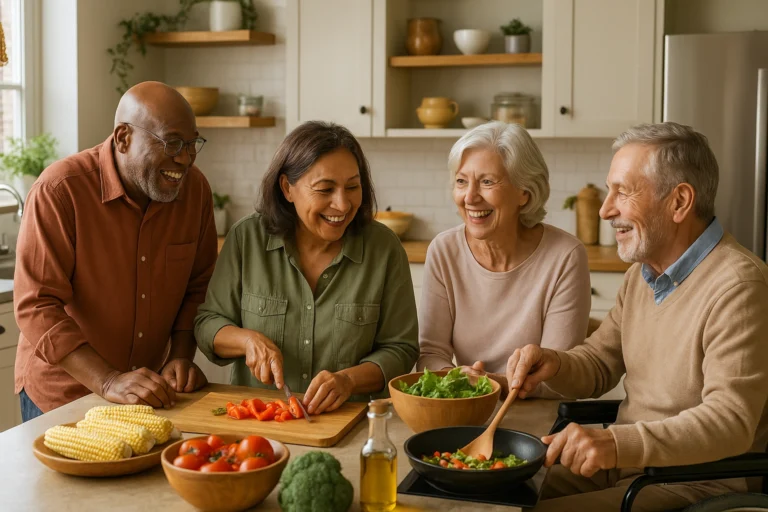Choosing a caregiver for your elderly loved one is a significant decision. The right caregiver can make a huge difference in keeping your senior happy and active, while the wrong one can lead to serious issues such as abuse or neglect. So, how do you pick the best caregiver for your senior? This article will provide key tips and advice to help you select the right one.
Have you ever wondered what makes the best caregivers stand out? What qualities and skills should you look for to ensure your senior gets the care they need? Find out in this detailed guide on finding the perfect caregivers for your elderly loved ones.
Key Takeaways
- Understand the importance of choosing the right caregiver for your senior’s well-being
- Discover the potential benefits and risks associated with different types of caregivers
- Learn effective strategies for finding the best caregivers to meet your loved one’s needs
- Recognize the value of involving your senior in the decision-making process
- Develop the confidence to trust your instincts and make the final choice
Understanding the Importance of Choosing the Right Caregiver
Choosing the right caregiver for your senior loved one is a big decision. It can greatly improve their life, keeping them active and supported. But, picking the wrong one can lead to serious issues like abuse or financial harm. It’s key to know the good and bad when picking a caregiver.
Decisions with Long-Lasting Consequences
Don’t take choosing a caregiver lightly. This person will deeply affect your loved one’s life every day. Make sure they have the right skills and values for the best care.
Potential Benefits and Risks of Caregivers
A good caregiver can make a big difference. They help with daily tasks, encourage staying active, and offer emotional support. But, a bad choice can lead to:
- Physical abuse or neglect
- Emotional or psychological trauma
- Financial exploitation or theft
- Lack of proper medical care or medication management
Be careful and take steps to avoid these risks when picking a caregiver.
Choosing the right caregiver is very important. Knowing the benefits and risks helps you make a smart choice for your loved one. Check out each candidate and involve your loved one in the decision. This ensures a good and lasting relationship with the caregiver.
How to Find the Best Caregivers for Seniors
Finding the best caregivers for seniors takes careful thought and planning. First, understand what your loved one needs and what you can afford. It’s important to include everyone in making decisions and to have a clear job description ready.
Choosing between a home care agency and an independent caregiver requires careful thought. Consider the advantages and disadvantages of each option. Whether you choose an agency or an independent caregiver, always conduct thorough interviews and background checks.
- Assess your loved one’s unique care requirements
- Involve family members in the selection process
- Develop a comprehensive job description
- Decide between a home care agency or an independent caregiver
- Perform in-depth interviews and rigorous background checks
By using these strategies to find top-quality caregivers, you can ensure your loved one gets the care they need. Remember, how to find the best caregivers for seniors is a big decision that affects their happiness and health.
“The right caregiver can make all the difference in the world for a senior’s health and happiness.”
Deciding Between Agency and Independent Caregivers
When looking for caregivers for your senior loved ones, you have two options: home care agencies or independent caregivers. Each has its pros and cons, and it’s key to know these to make a good choice.
Advantages and Disadvantages of Home Care Agencies
Home care agencies offer a detailed vetting process for caregivers. They check backgrounds, verify credentials, and ensure caregivers are well-trained. This gives you peace of mind, knowing your loved one is well cared for. However, these services are usually more expensive than hiring an independent caregiver.
Vetting Process for Independent Caregivers
Choosing an independent caregiver means picking someone who fits your loved one’s needs and likes. But, you have to do the vetting yourself. Interview them, check their references, and confirm they have the right skills and experience for top-notch care.
| Factors | Home Care Agencies | Independent Caregivers |
|---|---|---|
| Vetting Process | Comprehensive, including background checks and credential verification | Requires more extensive personal research and verification |
| Cost | Generally higher than independent caregivers | Typically lower than home care agency services |
| Flexibility | May have less flexibility in caregiver selection and scheduling | Offers more flexibility in caregiver selection and scheduling |
Consider each option’s pros and cons to decide what’s best for your loved one. The choice between a home care agency and an independent caregiver depends on what matters most to you and how much you want to be involved in finding the right caregiver.
Conducting Thorough Interviews and Background Checks
Choosing the right caregiver for your loved one is key. It’s important to interview and check their background well. This ensures you know their experience, skills, and trustworthiness. It helps you choose to keep your senior family member safe and happy.
Whether you’re looking at an agency or an independent caregiver, the vetting must be thorough. Begin by interviewing caregivers deeply. Ask them about their background, training, and how they care for others. This shows their communication skills, problem-solving, and if they fit with your loved one’s needs.
Then, do caregiver background checks. Check their credentials, certifications, and past work. You might call references, look at criminal records, and confirm their senior care experience. A detailed check gives you confidence that your loved one is with a trustworthy caregiver.
The vetting process for in-home caregivers must be careful. These caregivers will take care of your senior family member every day. Spending time to find the right caregiver greatly improves your loved one’s life and your peace of mind.
“The right caregiver can make all the difference in the world, not just for the senior, but for the entire family as well.” – Jane Doe, Certified Gerontologist
With thorough interviews and background checks, you can trust you’ve chosen the best caregiver. They will give your loved one the care, company, and safety they need.
Involving Your Loved One in the Decision-Making Process
Choosing a caregiver for your senior loved one means getting them involved. They will get the care, so their thoughts and likes should come first.
Ask your loved one what kind of caregiver they want. Do they like someone caring and attentive or someone focused on tasks? Getting their thoughts during interviews can help you find a good match for them.
Getting your loved one to involve seniors in caregiver selection builds trust and control over their care. This leads to better communication and satisfaction with the caregiver.
Senior input on caregivers is very important. Using their preferences and feedback, you can find a caregiver who really gets them.
Getting your loved one involved in picking a caregiver is the right thing to do. It also makes care better and more rewarding for everyone.
Trusting Your Instincts and Making the Final Choice
Even after interviewing many candidates, checking their references, and vetting them well, the final decision is still up to trusting your gut. It’s not just about their skills. How you and your loved one feel about the caregiver also matters.
Choosing the right caregiver for your senior might feel like a big risk. But it’s a key decision that can greatly affect their life quality. As you look at your options, listen to your gut feelings during the selection process.
It’s key to trust your instincts when picking a caregiver. This can help you find someone who really connects with and understands your loved one’s needs. Using both your gut and a careful look at qualifications can lead you to the final choice for a senior caregiver that offers the best care.
“Ultimately, the caregiver you choose should not only meet the technical requirements but also be someone you and your loved one feel comfortable with. Trust your instincts – they can guide you to the right decision.”
The decision is big, but think it over carefully and trust your gut. This way, you’ll make sure your senior gets the caring and tailored care they need.
| Factors to Consider | Importance |
|---|---|
| Technical Qualifications | High |
| Personal Connection | High |
| Intuitive Sense of Fit | High |
Recognizing That This May Not Be the Final Decision
Choosing a caregiver for your loved one is a big step, but it’s not forever. Caregiving plans can change, and if the first caregiver isn’t right, you can switch. Keeping an open mind helps make sure your loved one gets the best care.
Flexibility in Caregiver Selection
Today, picking a caregiver is flexible. Families can look at different options to find the best fit. Whether you go with an agency or an independent caregiver, you can change if needed.
Changing Caregivers if Necessary
If the first caregiver isn’t working out, it’s okay to change caregivers if needed. This decision isn’t final. Check how the caregiver is doing and switch if it’s best for your loved one’s care.
Being flexible and open to changes is important in caregiving. This way, your loved one gets the care they need. Remember, the first choice isn’t set in stone, so you can make the best choices for your family.
“Flexibility and adaptability are key when it comes to caregiving. Don’t be afraid to make changes if needed – your loved one’s wellbeing should always be the top priority.”
Building Confidence and Providing Encouragement
As a caregiver, your role is key in boosting your loved one’s confidence and offering constant encouragement. It’s more than just doing daily tasks. It’s about empowering seniors and giving them a sense of power. This can greatly improve their well-being.
Begin with small, easy goals and praise their wins, no matter how small. Celebrate their achievements, big or small. Let them know you believe in them. This helps a lot in building confidence in seniors and gives them the courage to face challenges.
Your words and actions matter a lot to your loved one’s emotional and mental health. Be kind, understanding, and supportive when they need it most. Show them you’re there for them at every step.
“The greatest gift you can give someone is your time, your attention, and your presence.” – Unknown
Creating a positive, empowering space helps your loved one feel more confident and resilient on their care journey. Providing encouragement for seniors is essential for giving them quality, whole care.
Exercising Compassion and Avoiding Useless Gestures
When caring for a senior loved one, it’s key to show compassion and skip useless gestures. This means sitting and talking with them during tough times, offering practical help, and checking in often. These actions show you care and can greatly improve their life.
Showing compassion to seniors is more than just doing something nice. It’s about connecting and supporting them when they need it most. Instead of making promises you can’t keep, focus on being there and helping out in real ways.
- Sit with your loved one and talk about what’s on their mind, letting them share their feelings.
- Help with everyday tasks like cooking, shopping, or personal care, rather than just offering to help whenever.
- Regularly check in, even with a quick call or text, to show you’re thinking of them and ready to assist.
By avoiding useless gestures and choosing compassionate actions, you make a big difference. This way, you support your senior loved one more effectively and ensure they feel cared for during hard times.

“Compassion is not just a feeling, but a way of being that transforms our relationships and the way we live our lives.”
Conclusion
Finding the right caregivers for your senior loved ones is very important. It greatly affects their well-being and life quality. By understanding this, you can look for the best, most caring people for your loved one.
You’ve learned about the good and bad sides of caregivers. You know how to pick the right ones and involve your loved one in the choice. You also learned how to support and care for them to make the experience positive for everyone.
The choice of caregivers is a big decision that needs thought and a focus on your loved one’s well-being. This article has given you the tools to make a good choice. It helps put your loved one’s needs first and supports their health and happiness. Remember, being open to change is important to make sure your loved one gets the best care.
Source Links
- https://www.healthinaging.org/tools-and-tips/tip-sheet-how-be-best-caregiver-you-can-be – Tip Sheet: How to Be the Best Caregiver You Can Be
- https://www.aplaceformom.com/caregiver-resources/articles/hiring-an-in-home-caregiver – Guide To Hiring an In-Home Caregiver | A Place for Mom
- https://www.ioaging.org/caregiving/tips-on-choosing-the-right-caregiver-for-an-older-loved-one/ – Tips On Choosing the Right Caregiver For an Older Loved One – Institute on Aging



